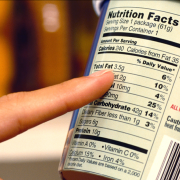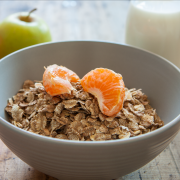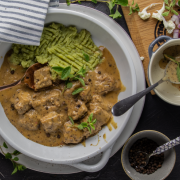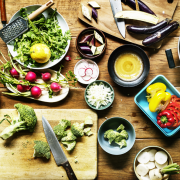 Sugar and Inflammation: A Slippery Slope
It is scary to think that sugar is one of the 10 most eaten foods in a South African’s diet. Local data has shown that we eat as much as 60g of added sugar per day, a whopping 12 teaspoons. Sugar is part of the carbohydrate food group, and, along with fat and protein, carbohydrates are one of the three food groups essential to human health. The problem comes in when a big chunk of our carbohydrate intake is not from healthy carbohydrates like fruit, wholegrains and legumes, but rather in the form of added sugar.
Sugar and Inflammation: A Slippery Slope
It is scary to think that sugar is one of the 10 most eaten foods in a South African’s diet. Local data has shown that we eat as much as 60g of added sugar per day, a whopping 12 teaspoons. Sugar is part of the carbohydrate food group, and, along with fat and protein, carbohydrates are one of the three food groups essential to human health. The problem comes in when a big chunk of our carbohydrate intake is not from healthy carbohydrates like fruit, wholegrains and legumes, but rather in the form of added sugar.The Inflammation Situation
Part of a normal immune response, inflammation is a natural physiological response and an essential part of stimulating the body’s natural healing processes. Think of inflammation like a slow burning fire. The trouble is that through poor dietary and lifestyle choices, this fire can get fueled and burn out of control for long periods of time. This so called chronic, low grade inflammation activates the body’s immune system which may cause unnecessary damage to healthy cells.
Some common signs of chronic low-grade inflammation include body pain, weight gain, frequent illness and infections, fatigue, and mood disorders like depression and anxiety. An increasing number of disorders (also influenced by our genes) are linked to inflammation, such as chronic diseases like cancer, heart disease, and diabetes , as well as effect mental health like increase the risk of Alzheimer’s disease and depression.
The Link Between Sugar and Inflammation
No food has more of a reputation in causing inflammation than sugar. Sugar, as well as other highly refined carbohydrates, has both a direct and indirect effect on inflammation. When we consume large amounts of sugar on a regular basis, this moves into the blood stream quickly and causes a spike in blood glucose. This directly triggers a host of metabolic changes in the body that kickstart the inflammatory processes. It is also thought that sugar stimulates the production of free fatty acids in the liver, the resulting compounds of which can trigger inflammatory processes.
The other way that sugar may indirectly trigger inflammation is through weight gain. This is because sugar doesn’t have much impact on our feeling of fullness yet is high in energy. We also tend to eat sugary foods with more sugary foods, compounding the problem. Together, this may mean we eat too much energy (kilojoules) leading to an increase in body fat. Excess body fat has been linked to inflammation, partly due to insulin resistance Therefore, the more overweight we are, the more proinflammatory cytokines are released, leading a continuous cycle of inflammation. It’s important to note though that natural sugar has not been linked to inflammation, behaving very differently to added sugar when consumed and digested in the body. In fact, many foods containing natural sugars, such as fruits and vegetables, are actually anti-inflammatory foods. Fruit and vegetables are rich in phytonutrients and antioxidants that soothe inflammation and are also accompanied by fibre which slow down the digestion and absorption of the natural sugar which prevents blood sugar spikes.
How to Put Out the Fire
The good news is that it’s possible to lower inflammation levels in the body through various dietary and lifestyle changes, in addition to cutting out sugar.
- Watch your intake of saturated fats such as the fat in chicken skin, fatty cuts of meat, cheese and coconut oil. These fats are bad fats as they are pro-inflammatory.
- Limit processed foods. Studies have shown that replacing processed foods with whole, unprocessed foods improves insulin resistance, improves cholesterol levels and reduces blood pressure, all of which are related to inflammation. FitChef meals are proudly made from whole foods and free from preservatives and colourants.
- Choose wholegrain carbohydrates. These high fibre carbohydrates help control blood sugar and protect against inflammation. FitChef meals use wholegrain carbs like brown rice, wholewheat pasta and quinoa.
- Eat more fruits and vegetables which are rich in antioxidants, vitamins and minerals that protect against and reduce inflammation in the body. Aim for half a plate of salad and/or vegetables with each main meal and include at least two fruits each day in your diet. Grab a FitChef smoothie to help boost your fruit intake.
- Focus on anti-inflammatory omega-3s in fatty fish like salmon, trout, pilchards, sardines and mackerel. Flaxseeds/linseeds also have small amounts of omega-3s.
- Flavour your food with ginger and cumin, which are known to have anti-inflammatory property.
- Learning to read food labels is a vital skill in the quest to watch your sugar intake. Other common names for sugar to look out for on food labels include sucrose, fructose (high fructose corn syrup/ corn syrup), glucose, maltose, dextrose, and even foods like honey and molasses.
- Maintain a healthy weight. Excess body fat is known to increase inflammation.
- Regular activity has been shown to lower inflammatory markers in the body. The decreases in inflammation markers seem to be related to decreases in belly fat. Being active can also help manage weight which manages inflammation.
- If you smoke, stop smoking.
- Manage your stress levels and ensure you get enough sleep.
- Della Corte KW, Perrar I, Penczynski KJ, Schwingshackl L, Herder C, Buyken AE. Effect of Dietary Sugar Intake on Biomarkers of Subclinical Inflammation: A Systematic Review and Meta-Analysis of Intervention Studies. Nutrients. 2018;10(5):6060. DOI: 10.3390/nu10050606.
- Frassetto LA, Schloetter M, Mietus-Synder M, Morris RC Jr, Sebastian A. Metabolic and physiologic improvements from consuming a paleolithic, hunter-gatherer type diet. Eur J Clin Nutr. 2009;63(8):947-55. Doi: 10.1038/ejcn.2009.4.
- Gialluisi M.Bonaccio. A.Di, Castelnuovo S, Costanzo A, De Curtis M, Sarchiapone C, et al. Lifestyle and biological factors influence the relationship between mental health and low-grade inflammation. Brain Behavior and Immunity. 2019. Doi: https://doi.org/10.1101/609768.
- Ihalainen JK, Schumann M, Eklund D, Hämäläinen M, Moilanen E, Paulsen G, et al. Combined aerobic and resistance training decreases inflammation markers in healthy men. Scandinavian Journal of Medical Science. 2018;28(1):40-47. Doi: 10.1111/sms.12906.
- Joseph SV, Edirisinghe I, Burton-Freeman BM. Fruit Polyphenols: A Review of Anti-inflammatory Effects in Humans. Crit Rev Food Sci Nutr. 2016;56(3):419-44. Doi: 10.1080/10408398.2013.767221.
- Teng KT, Chang CY, Chang LS, Nesaretam K. Modulation of obesity-induced inflammation by dietary fats: mechanisms and clinical evidence. Nutrition Journal.2014;12:13.
- Zhu F, Du B, Xu B. Anti-inflammatory effects of phytochemicals from fruits, vegetables, and food legumes: A review. Critical Reviews in Food Science and Nutrition. 2017;58(1):1-11.

 No added or artificial sugars
No added or artificial sugars The cleanest ingredient labels
The cleanest ingredient labels






